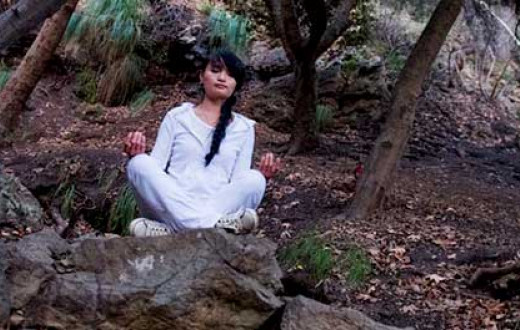
(Photographer: Amit Shinde. Below is a continuation of the post Never Complain, Never Explain)
Yesterday, I spoke about Republic Day celebrations. To celebrate Republic Day is to celebrate and honour Brahmajnana (Knowledge of the Brahman or the Absolute). How is this so? When we were born into this world from our mother’s womb, we became ‘public’ to this entire world. Otherwise before birth we were in a ‘private’ state, isn’t it?
Again after three years of age we became private. We became closed and limited to our individual selves. We got stuck in “Me and mine”. We would only think about “My mother” or “My father”, etc. So we again became ‘private’. Now when this realization dawns on you that there is nothing private for you, and everything is public, everything and everyone belongs to you – then once again you become ‘public’. And so it becomes a ‘re-public’. You become a Dvija (twice-born, here meaning onto the path of knowledge and awareness).
So from being ‘private’ you became a ‘re-public’. This is the sign of being a gyani (wise or knowledgeable one). When you see the essential oneness between the world within you and that outside you, then that is knowledge. If you feel differently within and behave differently outwards, then that is not being ‘re-public’. Did you get what I am saying?
See, when the destination is one, then there can be many ways to reach that place, isn’t it? So why should there be any conflict? When one does not use the intellect to understand the deeper truth, then one would think there is a conflict.
You know, even disciples of the same saint or Guru fight with each other. See, Jesus Christ was only one, yet today we see that there are 72 different sects in Christianity.
Prophet Mohammed was one, but today there are five different sects in Islam. Followers of one sect do not mingle or follow the teachings of another sect. The beauty of India is that despite there being so many diverse religions and schools of thought, there is no enmity or conflict between any of them. Some people are devotees of Lord Hanuman, some others are followers of the Mother Divine, and some others worship some other deity. Do they ever fight among each other? The advantage of having so much diversity in our culture is that it has brought about great respect and tolerance for other religious faiths and beliefs. Do you get what I am saying?
How many gods and goddesses are there in India? There are thousands and thousands of gods and goddesses in India today. Yet people who worship one deity still go to the temple of another deity also, isn’t it so? Do they ever fight between each other? So people may fight despite knowing that God is only one, and yet we see that even when there are so many gods and goddesses being worshipped, people still respect each other’s beliefs and live in harmony.
You must have seen that a ‘Born Again’ follower (a sect in Christianity) will never enter a Catholic Church, and a catholic will never enter into a Church of St. Luther. A follower of St. Luther’s church will never go to a Presbyterian Church. They never step into another’s house of worship. But in India, everyone goes everywhere or not? Do you not see Hindus going to a Church, or to a Jain temple? And do you not see Jains going to a Hindu temple? Haven’t you seen Hindus going to a Buddhist temple also? So everyone freely goes to another house of worship. Why is this so? This is because we have become habitual of living in harmony in the midst of so much diversity.
That is why in the Bhagavad Gita, Lord Krishna has not spoken about just one path to reach the Divine. In the Gita, Lord Krishna says that some worship the Divine by practicing abstinence and Mittahara (restraint in diet and lifestyle); some others attain the Divine through meditation; some contemplate upon the Divine through Sadhana; some others perform various Yajnas to please the Divine; some perform Japa Yajna (chanting as a means to attain the Divine); and there are some who take to the path of Self-knowledge to attain the Divine, and so on.
So there are multiple ways and beliefs to attain the Divine, and being able to accept and honour them all is what makes one truly great and noble.
In India, no gyani (wise or knowledgeable seer) was ever hanged or executed in any way, regardless of what caste or religion they belonged to. A Brahmagyani (one who is established in Self-knowledge) has always been highly respected in India, regardless of his roots and origin.
Why do you not ask me this, "Why does everyone have a different kind of nose?" Why hasn’t God created everyone alike, just like the assembly line of a car factory?
You know, everyone’s thumb impression is different from the others. So when everyone can have a different and unique thumb impression, then why can’t there be many schools of knowledge here?
When you see all this, you should understand that Divinity loves diversity.
Now why did you not ask me, “Gurudev, why did God create so many different kinds of vegetables? Could he not have just created eggplant?” Then God would have made you have eggplant for breakfast, lunch and dinner and even for snacks. Why did you not ask this?
So, in the same way, saints can have different approaches and beliefs. They are free to do that. They are not copy cats, they do not mimic each other’s philosophy and ways. They express knowledge in their own originality. I also speak in my own style. If you like it, then take it, else drop it. I am not going to change (laughter).
Well, then your question is also an illusion. Why should I answer an ‘illusion’? (Laughter) See, you should not make comparisons. Everything here is unique and has its own place, so it should be honoured and respected accordingly.








































